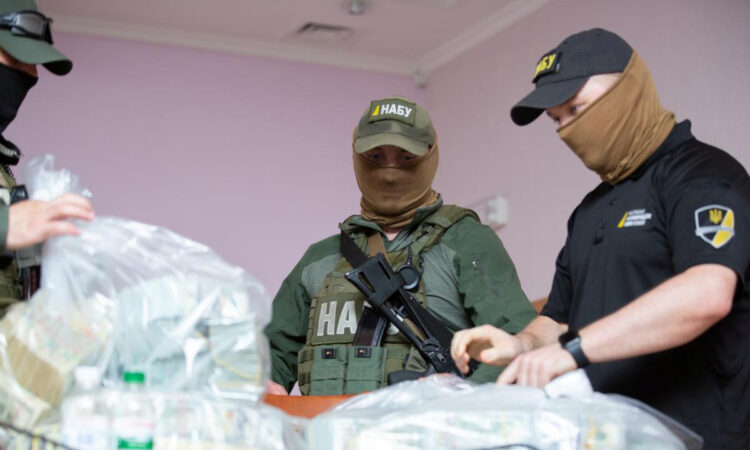
Much of the attention on Ukraine is rightly focused on the frontlines of its defensive war against the Russian invasion. But Kyiv is also fighting the internal enemy of corruption.
The recent decision by Ukrainian President Volodymyr Zelenskyy to relieve Defense Minister Oleksiy Reznikov of his duties may have seemed abrupt, but it wasn’t completely unexpected. As tough fighting during the Ukrainian counteroffensive in the South and East continues, Zelenskyy has spoken of the need for a “new approach and new forms of interaction, both with the military and society.” He announced that Reznikov would be replaced by Rustem Umerov, a Crimean Tatar and well-known political figure whose appointment is likely to garner quick approval from the parliament. At the heart of this decision was a corruption scandal uncovered by the Ukrainian press that rocked the government. Reznikov is not alleged to have been involved, but he was the minister responsible.
His removal should be understood as the result of the pressure building following a number of instances of corruption in military procurement and recruitment. The Ukrainian press reported that, while Reznikov was highly successful in securing deliveries of Western weapons, he was unable to stem graft at the Ministry of Defense (MoD), which has included schemes where draft-age males paid bribes to leave Ukraine and otherwise avoid service. In an earlier instance, around $3.2m in food contracts were said to have been tainted by graft. None of the allegations to date have involved Western-supplied weaponry.
It is risky to make personnel changes in key positions when the country is locked in an existential struggle, but this development should be taken as a positive sign of the country’s ongoing reforms.
President Zelenskyy addressed the issue head-on, speaking about bribes of thousands of dollars being accepted by crooked officials to secure a medical deferment and announcing that he was relieving all heads of draft boards.
Clearly, Kyiv is aware of how damaging to its reputation the continuing issue of corruption has been. A recent report indicated that the MoD had purchased 180,000 uniforms from Turkey for the army, but instead of winter uniforms that will be needed in just a few months, summer uniforms were delivered. Reznikov disputed the veracity of such reports, but the stories continued to appear.
There can be no question that such reports will be used by opponents of continued Western aid to Ukraine to argue that the money the West provides to help Ukraine defend itself is being siphoned off and wasted.
Get the Latest
Sign up to receive regular emails and stay informed about CEPA’s work.
But Ukraine has been acting to improve and renew its commitment to good governance. In 2015, with help from its Western partners, Ukraine created the National Anti-Corruption Bureau of Ukraine (NABU). As Reuters reported in August, Semen Kryvonos, NABU’s head, emphasized that “corruption is no longer seen as just a crime, but as a crime against national security.” This is in line with statements by President Zelenskyy and others that corruption will be considered treason.
In addition to defense, NABU has focused on strategic areas such as reconstruction and energy, targeting officials who have engaged in graft. Among the high-visibility cases NABU has pursued was the arrest of the Supreme Court chief for allegedly accepting $2.7m in bribes and another against a deputy minister suspected of skimming off funds donated for Ukraine’s recovery.
The government in Kyiv well knows that negotiations now underway on European Union (EU) membership, in addition to Ukraine’s prospects for NATO entry, hinge on its progress in its fight against graft. Likewise, it hopes for huge inflows of foreign investment and other Western funds for reconstruction once the war ends. Thus far, NABU, together with the anti-corruption prosecutor’s office, has launched some 300 cases and referred 58 indictments to court. This is genuine progress, though more needs to be done. If the West wants Ukraine to succeed, it should dedicate additional resources to the fight, especially funds for NABU to hire more investigators and stand up additional units to accelerate its work.
While much remains to be done, the country is making significant strides. The Organisation for Economic Cooperation and Development (OECD) has recognized this progress, while the country is a member of the OECD Anti-corruption Network for Eastern Europe (OECD/CAN), enabling the OECD to track Ukraine’s anti-corruption reforms.
This is an issue that ordinary Ukrainians care about very deeply — they are dying for a better future and want no return to the bad old ways. Opinion polling is absolutely clear on this, showing that victory over Russia and over graft are equally important in the popular mind.
While the challenges are daunting; this is all the more reason for the West to continue to support Kyiv in its fight to restore public trust, and that with help from its friends, it will get there.
Too much is at stake in Ukraine for the future of Europe to allow the country to fail — it must not only win against the Russian invaders, but also defeat the enemy within.
Chels Michta is a Nonresident Fellow with the Democratic Resilience Program at the Center for European Policy Analysis (CEPA). Chels is a former CEPA Title VIII Fellow and is currently a military intelligence officer serving in the US Army.
The opinions expressed here are those of the author and do not reflect the official policy or position of the Army, the US Department of Defense, or the US government.
Europe’s Edge is CEPA’s online journal covering critical topics on the foreign policy docket across Europe and North America. All opinions are those of the author and do not necessarily represent the position or views of the institutions they represent or the Center for European Policy Analysis.
Europe’s Edge
CEPA’s online journal covering critical topics on the foreign policy docket across Europe and North America.







